#Broadway Theatre
Text
How funny would it be if one of the Phantom of the Opera cast members decided to stay... under the stage... and torment every other production ever performed there...?
14K notes
·
View notes
Text
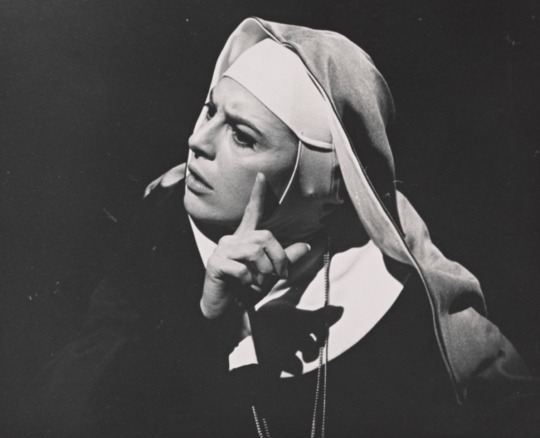
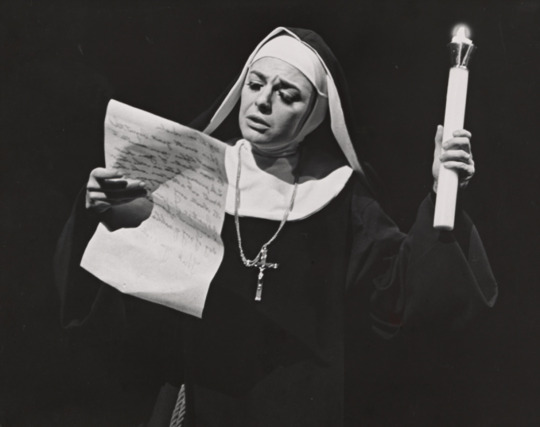
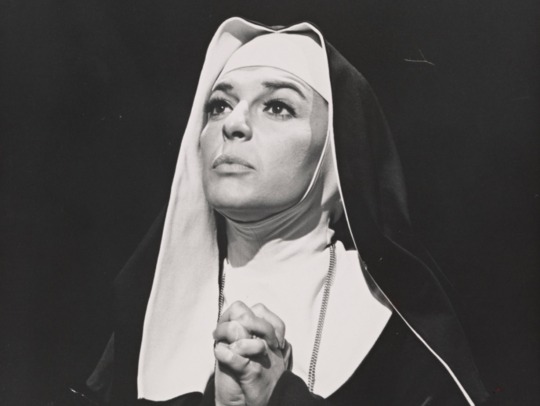
Anne Bancroft in the stage production of The Devils, 1965
#anne bancroft#the devils#play#plays#stage production#60s#1960s#yayyy#nuns#!!#theatre#billy rose theatre division#1965#broadway#broadway theatre#john whiting#vintage 60s#photography#black and white#black and white photography#theatre photography#theater#broadway play
109 notes
·
View notes
Text

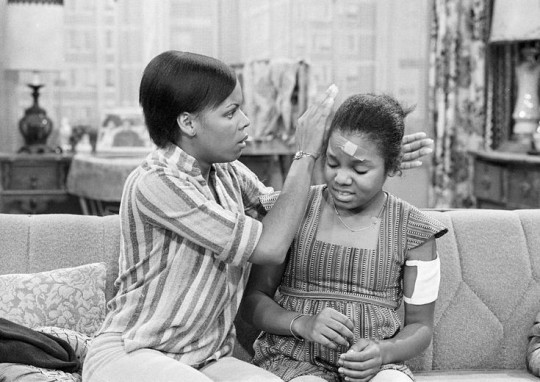
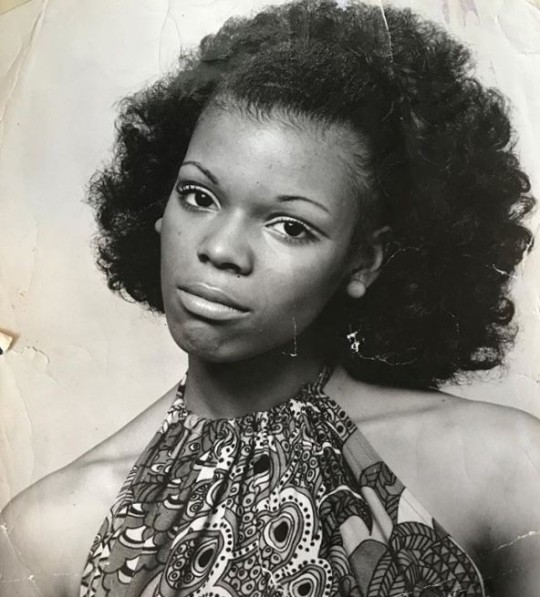
Chip Fields, sometimes credited as Chip Hurd or Chip Fields-Hurd, is an American singer, actress, television director, and producer who has appeared in popular films, television shows, and Broadway theatre. She is best known for portraying Lynetta Gordon, the abusive birth mother of Penny Gordon Woods (played by Janet Jackson), in a four–episode story arc (1977) of the 1970s sitcom Good Times.
#chip fields#black tumblr#black excellence#black community#black girl magic#talented#american actress#american singer#broadway theatre#good times#tv shows
114 notes
·
View notes
Text
One of my favourite, and in my opinion one of the most important, aspects of Falsettos is the way that it's not about AIDS, not wholly.
Yes, it absolutely expresses the hurt and the anger of the AIDS crisis, and of how queer people were affected by it, and of the queer solidarity that arose from it, and that is something that cannot be overlooked. But it's not about AIDS in the way that Rent or Angels In America is about AIDS.
Those works took those feelings, took that hurt, and said "fuck it, I'm gonna do something with it." They were written not just as awareness for the crisis, but to heal as well. To inspire hope, to inspire the drive to fight for the community, to celebrate queer lives.
But that's not what Falsettos does. That was not it's intention to begin with.
Falsettos is a story. It is the story of a man. It is the story of a Jewish gay man, in the sixties till the eighties, and his life. If we include In Trousers here, it's a story from him growing up, his denial regarding his sexuality, and then learning to accept it and accept himself, bit by bit. It's about him building a family not by blood but by choice. But of course, it was the mid-eighties(ish), and his life would come to it's likely conclusion.
This is why I feel like it's important to talk about why Falsettos isn't just about the AIDS crisis. In a lot of discussion around it, that aspect is something many people focus on (and for good reason, we shouldn't forget it) but Falsettos is so much more than that.
It's about maturing, about letting go of heteronormative and societal standards of what it means to be a family, or a husband. It's about learning to love, both yourself and others, and about a family learning to be a family.
In the words of Marvin himself:
"It's about growing up, getting older, / living on a lover's shoulder. / Learning love is not a crime. / Its about time."
#falsettos obsession#falsettos#falsettoland#falsettos musical#march of the falsettos#in trousers#william finn#queer pride#queer love#lgbtqiia+#lgbtq#lgbt community#lgbtq solidarity#aids crisis#broadway#broadway theatre#musical#musical theater fandom#musical theatre#debs own posts
399 notes
·
View notes
Text

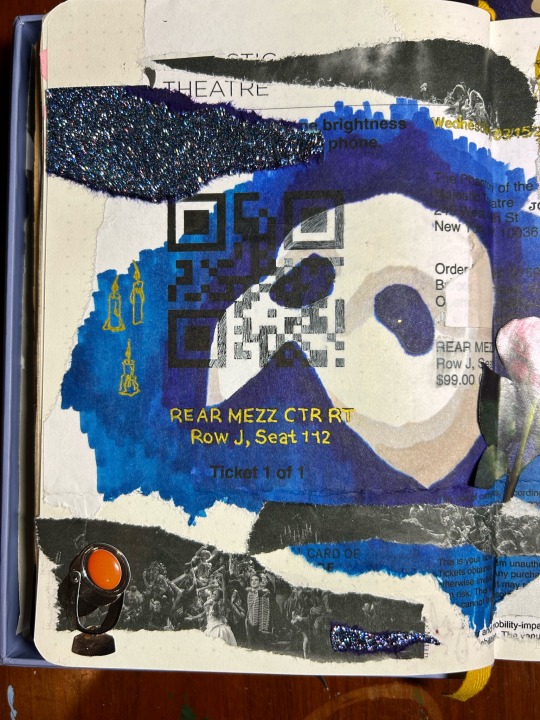
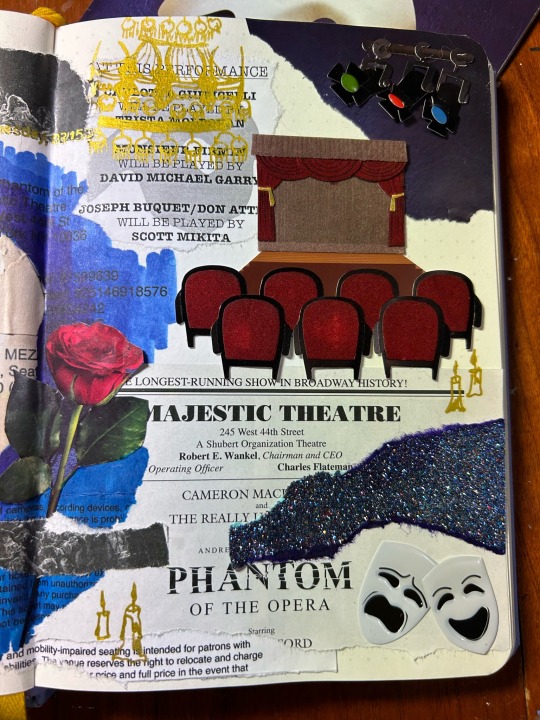
#phantom of the opera#theatre#theater#musical theatre#andrew lloyd webber#scrapbook#journaling#art journal#collage#creative reuse#mask#lights#theatre lights#broadway#new york#new york city#broadway theatre#musical#the music of the night#the phantom of the opera is there#tickets#opera#comedy and tragedy#majestic theatre#glitter
182 notes
·
View notes
Text
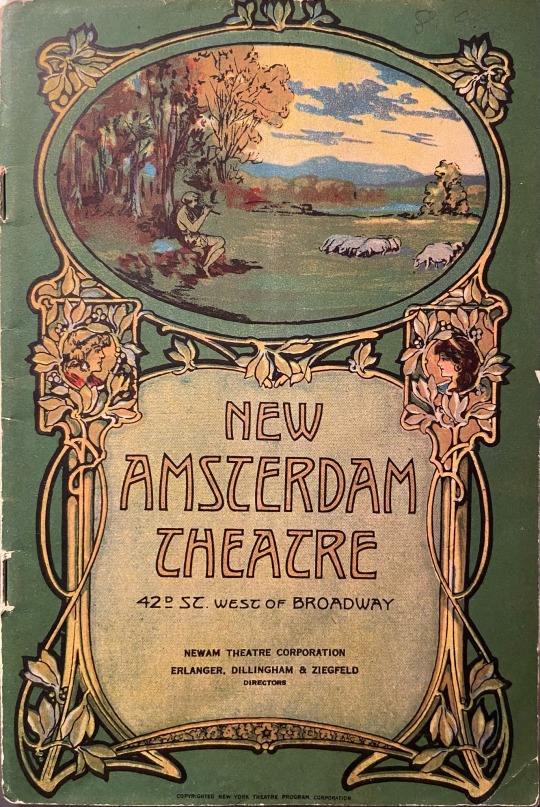
1925 Playbill for the show “Sunny” at the New Amsterdam Theatre on 42nd Street.
#history#nyc history#1920s#new york city#nyc#vintage nyc#art nouveau#broadway theatre#broadway history#broadway#playbill#42nd street#voca1ion
22 notes
·
View notes
Text


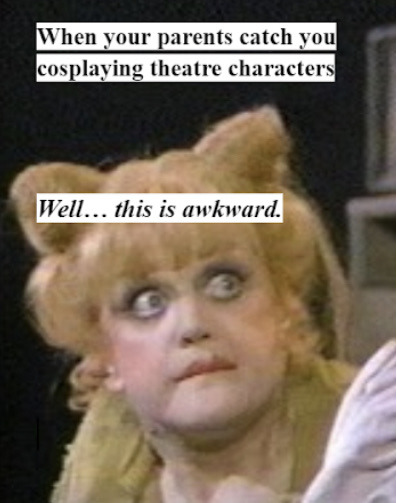
I really want to visit New York, the UK… ANYWHERE there’s a good musical!
🗞️❤️💚💛
#newsies#newsies musical#jack kelly#david jacobs#spot conlon#les jacobs#newsies broadway#racetrack newsies#crutchy newsies#mush meyers#albert dasilva#newsies memes#sweeney todd#mrs lovett#josh groban#broadway theatre#heather chandler#heathers#jd heathers#heather duke#heather mcnamara#veronica sawyer#bonnie and clyde#bonnie and clyde musical#uk tour#angela lansbury#musical cosplay#beetlejuice musical#wicked musical#elphaba
51 notes
·
View notes
Text

Leaving Avis here- I do t know, inspiration hit and I kinda like this one!
But this quote hits deep to be honest. Antisemitism is on the rise,. Jewish actors/actresses are being erased from the scene by non Jewish actors who play roles of Jewish characters. It’s disappointing…
Yes, Patti LuPone is absolutely amazing as Avis Amberg, I LOVE her in this character! Avis is Iconic!!!!!
But still, there are so many women who are actually Jewish, like Avis. They weren’t given a chance to break through in this roll. Even when they’d be able to add an aspect to the character that a non jewish actress wouldn’t be able to do. There are aspects to Avis’s character that could have been enhanced by the personal experiences of Jewish women. (Sorry- wording reads a little weird here. I am not words today)
The character of Avis faces death threats, hate crimes, being looked over in the acting industry, being left behind and abandoned by society due to physical features that were not in her control. Also for being a part of a minority ethnic group.
Jewish women have struggled with these things relentlessly for generations. Jewish women have wrested antisemitism and hate and have been targeted because of their Jewish heritage.
Now I do know that Patti has experience with hate, abuse and bullying in the industry. I acknowledge her struggle and the pain it causes her. It’s valid! No one should be treated in such terrible ways! People need to respect others no matter what!
Yet she hasn’t faced what many Jewish women have gone through for generations.
Sadly, we carry so much generational trauma from such acts of pure violence.
Many women in my community have first hand experience with all of this. Go up to any woman/girl at any synagogue and they’ll have at least one story about an act of antisemitic hate, violate, comment, joke, micro aggressions- made towards them.
Patti hasn’t experienced these acts of hate in this specific situation and circumstance. She can’t. Because she’s not a Jewish woman.
Jewish women shouldn’t be facing violence or hate. No one should.
We can start making the entertainment industry more accessible to Jewish people, by giving Jewish people the spotlight for the characters who are written as being Jews!
#helena rubinstein#broadway#patti lupone art#broadway theatre#company the musical#patti lupone#warpaint#stephen sondheim#evita#sweeney todd#hollywood#ryan murphy#avis amberg#Jewish#jewish life#jewish actors#jewish positivity#jewposting#Hollywood2020#Patti Lupone Avis Amberg#AvisAmberg
28 notes
·
View notes
Text
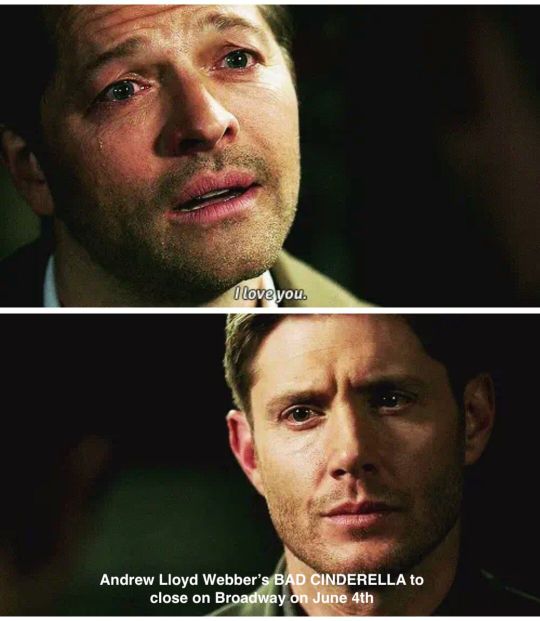
#anyway...#exposing myself as a theatre kid guys sorry#but this show was just a very interesting moment#a car crash I couldn't look away from#really sad to the cast and crew who will be losing jobs though#bad cinderella#andrew lloyd webber#andrew lloyd webber's bad cinderella#broadway#broadway theatre#tony awards
32 notes
·
View notes
Text
Revolting Children - Matilda the Musical Broadway (2013) - Late Night with David Letterman
youtube
this was one of my favorite performances back in the day but it seems like it's no longer on youtube. So I decided to reupload it - enjoy :)
#revolting children#matilda the musical#matilda broadway#matilda the musical broadway#matilda 2013#matilda the musical video#revolting children video#original broadway cast#broadway musicals#broadway theatre#bertie carvel#this cast is so talented#I haven't watched the musical movie yet but I prefer the musical over the movie version (why are these kids doing tiktok dances??)#videos in the palace#edits in the palace#Youtube
49 notes
·
View notes
Text
When you tell people you’re gonna become an English teacher but really your dream is to be center stage of in the biggest hit on Broadway
2 notes
·
View notes
Text
jekyll and hyde confrontation except its micheal jacksons man in the mirror
#text#text post#text posts#text meme#jekyll and hyde#dr jekyll and mr hyde#doctor jekyll#henry jekyll#mr hyde#edward hyde#jekyll and hyde musical#broadway#broadway musicals#broadway theater#musical theater#theater#musical theatre#theatre#broadway theatre#theater kids
89 notes
·
View notes
Text
Back to the Future on Broadway

View On WordPress
#back to the future#back to the future musical#back to the future the musical#broadway#broadway musical#broadway musical review#broadway show#Broadway theater#broadway theatre#musical#musical review#musical theater#musical theatre#musicals#new york#New York city#winter garden theatre
2 notes
·
View notes
Text
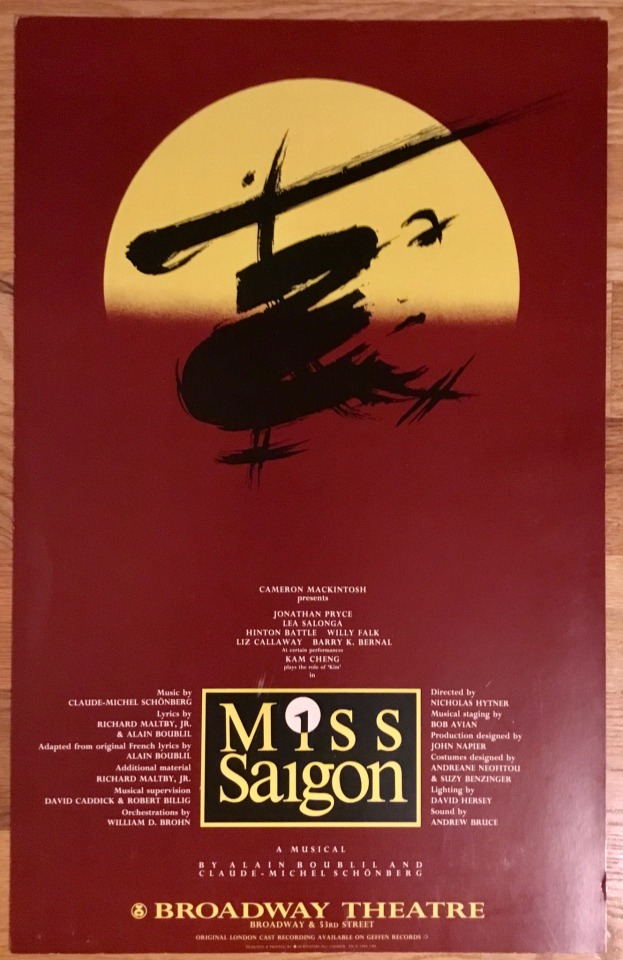
Miss Saigon
Broadway Theatre, Broadway at 53rd Street, N.Y.C.
Theatre Poster
#poster collector 1975#miss saigon#jonathan pryce#broadway theatre#broadway#promotional posters#theatre poster
4 notes
·
View notes
Text
Into The Woods: Why the movie was shit
I'm not the first person to talk about this, nor will I be the last. It's pretty widely accepted among theatre fans that Disney bungled up this fantastic show. But it's important nevertheless to talk about how it went wrong, 'cause adaptations are delicate things, and the core of a good adaptation is an understanding of the themes and messages that constitute the story, and not just the story itself. Stephen Sondheim and James Lapine together wove a fairly meticulous fabric that is this musical, and it's fascinating to see how Disney's adaptation reduced it to rags.
For a summary of this show's plot, I recommend watching the first few minutes of Sideways' video on the themes in this show, mainly because it's a fairly complex plot and he explains it well. This is especially important, since the plot of the movie is……definitely not the same.(The whole video is definitely worth a watch too, and it brings up points that I might talk about here too.) Done that? Good, let's keep going.
"The narrator comes on stage, and he starts, 'Once upon a time.' Now once he says that, the audience starts to relax inside. Now what I wanted to do was to wake them up immediately, so before [the narrator] gets to the fifth word, I wanted a loud sound from the orchestra, or the piano"
That was Stephen Sondheim talking about the very beginning of the show. The choices he made in the songs were almost all deliberate, they were for a reason.
Now what does the movie do? They say the entire first line of the song before playing the musical sting. They knew that they had to have that there, since it was part of the prologue song, but they didn't understand at all why the song was structured the way it was.
Let this be an omen as to how the movie will adapt this musical.
Another important part of the first song is the constant quarter note motion the piano makes throughout. It's what keeps the energy of the first song going, and is the song's connective tissue. Guess what the movie didn't do? As a result, it makes the prologue feel like five different disconnected small songs.
The main problem that the adaptation suffered, was the removal of seemingly small things, but which ultimately led to the plot of the movie collapsing in on itself.
The first major one is the removal of the narrator and the baker's father. Yes, the movie technically had a narrating voice, and the father got….like one scene, both played much more prominent roles in the original musical. The baker's father, initially a mysterious old man, pulled many of the threads that made the various characters really interact, and he's an outside force helping move the story along. As for the narrator…well it's important to note that the narrator is a character. A major feature of the show is that it's a story with characters, and the show knows that. The narrator dictated how the story would go, and when the witch sacrifices him to the giant, the characters are left to fend for themselves, and that is how most of the destruction in the second act really happens.
The second one is Rapunzel's death. In the musical Rapunzel is crushed by the giant, and it leads to Witch's Lament:
"This is the world I meant. / Couldn't you listen? / Couldn't you stay content, safe behind walls / As I could not?"
An important thing to note is while yes her relationship with Rapunzel is definitely toxic, there's a complexity that arises out of her over sheltering Rapunzel to protect her, and then as a result she comes to despise that "shelter", and is then ultimately killed. The fact that she is grieving the loss of her daughter plays largely into her character in the second act, something that is entirely lacking in the movie. SO MANY OF HER LINES get undermined by this one detail, that Rapunzel never died, and that she was wrong the whole time.
Lastly, songs that were cut. There are four main ones that are important to talk about.
First, Maybe They're Magic. It's sung right after the Baker and his wife sell the beans to get the cow. It's the first time the question of whether or not they'll really have to lie and possibly steal to obtain the items, and what the ethics of it really are, arises. It also exemplifies the character of the Baker's Wife, and her more clever side, which we further see when she obtains her items mostly through either deceit or persuasion. This glimpse into her character helps set her up for 'Moments in the Woods', a song much later which also expresses her inner thoughts.
Two: Ever After/Prologue: So Happy. This is how the show ends its first act and begins the second. In the movie the events in the second act occur immediately after the wedding, while in the musical there is a time gap between the acts. The music is referenced in the instrumental track, but it's never actually sung. Although the songs are definitely very much suited for a theatrical performance, cutting both the songs means that the resulting events that occur within them have to be shuffled and rearranged. The way that the characters make their way into the woods changes, and the prince and Rapunzel run off together much later, which doesn't allow for their later scenes to ever happen in the movie. It's where the cracks in the movie start to show, and ultimately the way the decisions made for earlier parts snowballs into the later parts of the movie.
Three: Agony Reprise. Agony as a song is famous from both the movie and the show. However the reprise happens in the second act, when it turns out the two princes are not focused on the giant, but in fact on another maiden somewhere else, much like how they were in the first act. Except now they're married. Removing this song is basically like telling a joke without the punchline. Yes, Agony by itself is funny, but it's the perfect setup for its reprise. As the plot stood in the movie, it's clear why it couldn't be put in, but,,,like that's the problem. That's the whole problem
Finally: No More. This song is the one I'm most mad that they cut out. It's the final interaction the Baker has with his father, just after he runs away leaving his baby son with Cinderella. The movie,,,,badly paraphrases it, and then cuts to the Baker,,,,,crying? There's no actual emotional development, no actual introspection, and it removes one of the best written scenes in the show.
"Where are we to go?
Where are we ever to go?
Running away—we'll do it
Why sit around, resigned?
Trouble is, son
The farther you run
The more you feel undefined.
For what you left undone,
And more, what you left behind"
I implore you, watch this scene, if nothing else. It's a work of art, and the fact that it's completely cut out is a crime.
Pretty much every character in the movie became a duller and flatter version of their original, but the most egregious examples are Jack and his mother. Jack is older in the show, significantly so. He's basically in his late teens, and is sweet and naive, but not particularly bright. In the movie, however, he's,,,,a child. Like just straight up a child, and now his personality is no longer "too ungrounded for his age" but instead it's exactly how a child his age might act. Conversely, Jack's mother is overbearing, but ultimately 'stern but sweet', and is much more gentle with Jack than in the movie. In the movie though, she's mean and almost callous towards Jack, in a way that doesn't make her an enjoyable character.
I won't blame the actors for most of this. Yes, a point can be made that some of the acting itself may have been bad, but most of the fault in what I've talked about goes to the directors and script writers.
In every adaptation, choices need to be made. Since this was no longer a theatrical performance, liberties had to be taken to fit it into a film format. But each choice has a consequence, and their choices to change parts of the story snowballed into the climax of the movie, making it almost entirely different from the musical.
We talk about Into The Woods as a Sondheim show, but it is just as much a show by Lapine as it is by Sondheim. Lapine's ability to craft a story with strong and clear themes, no matter how complex or abstract the plot is, is one of the show's greatest assets. The movie was a disservice to original stage musical, but most of all it was a disservice to Lapine, taking his carefully crafted story and muddling and twisting it, until the end product had killed the central spirit of the original.
#into the woods#into the woods movie#into the woods musical#broadway#musical#musical theatre#musical theater fandom#musical theatre trash#rant post#broadway theatre#analysis#fuck disney#in general but also for this specific gripe#stephen sondheim#james lapine#sondheim shows#im not gonna tag any of the actors obviously#except maybe#james cordon#no one on that tag is a fan of him#right?#bernadette peters#fairytale#im still salty#about this movie#also its so fucking dark you cant see shit
167 notes
·
View notes
Text
FIXING SISTER
1916
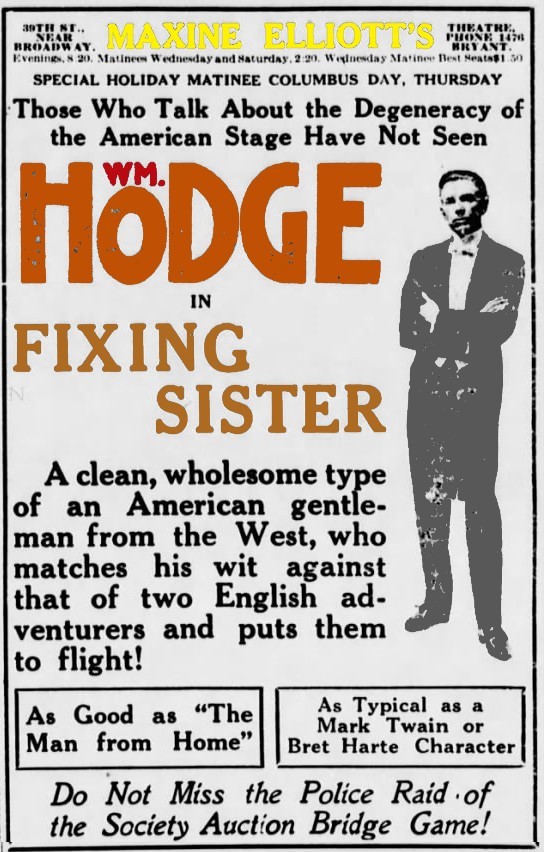
Fixing Sister is a four-act play by Lawrence Whitman (aka William Hodge). It was originally produced by Lee Shubert starring Mr. Hodge.
‘Fixing Sister’ tells how a devoted brother outwits a headstrong sister who has been carried away by the temptations of luxury, title-hunting, and bridge whist gambling, in the midst of the gay society life of the metropolitan rich. As a result of her foreign travels, she has almost annexed a foreign nobleman of untested lineage. Her brother. John Otis, a representative American of a shrewd and humorous sort, learning of his sister’s peril, hastens to New York from Kansas City. It Is his native common sense and shrewdness which effect a not sudden, but finally very effective, cure, including staging a police raid at her bridge party. He also rescues his own sweetheart, a tantalizingly Independent sort of American girl, from the wiles and the guiles of New York society and foreign nobility.
All four acts take place in New York City.
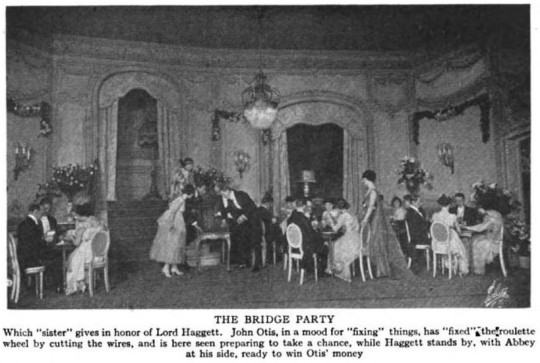
Bridge whist is a card game popular in the early 20th century. It was derived from whist with the additional rules that the players would take turns as dummy and that the trump suit would be deliberately chosen (including the option not to have one) on each deal rather than random.
"Next Thursday night will be ‘police night' at Maxine Elliott's Theater, when the members of the police department gambling squad will attend in a body to see the performance of William Hodge in ‘Fixing Sister,' in order to enjoy the spectacular police raid of a gambling party, which furnishes an exciting climax to the third act.” ~ EVENING STAR

The somewhat odd title was one of a dozen considered by Hodge. It was originally announced as The Social Climbers, but that seemed too similar to Clyde Fitch’s 1901 play The Climbers.
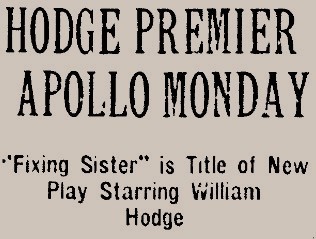
Fixing Sister opened in Atlantic City at Nixon’s Apollo Theatre on January 16, 1916. From there, it traveled to Wilmington DE, Altoona PA, Pittsburgh PA, and Boston MA.
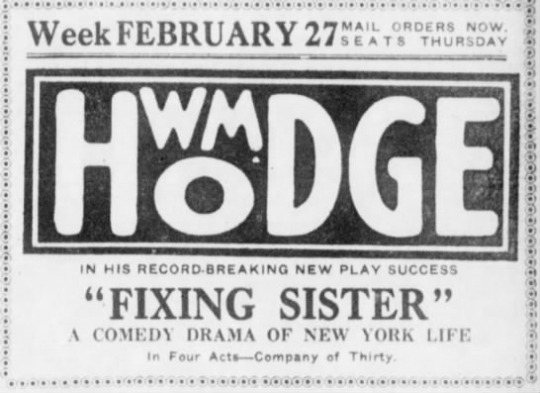
After Beantown (Boston), Hodge and company went to the Motor City (Detroit) before returning to Boston’s Majestic, where business was brisk.
“As an indication of the volume of business being done, it was necessary, on Ash Wednesday, to place the orchestra on the stage and sell seats in the pit usually occupied by the musicians.”
In mid-March 1916, Hodge made a formal announcement confirming the rumors that he was indeed playwright Lawrence Whitman. At the end of March, Hodge took on a second play in his downtime: Hobson’s Choice at the Wilbur. He requested that Mr. Shubert cancel one of his Fixing Sister matinees so that he might perform in Hobson’s, but Shubert declined. Instead, he arranged a special benefit of Hobson’s at an alternate time.
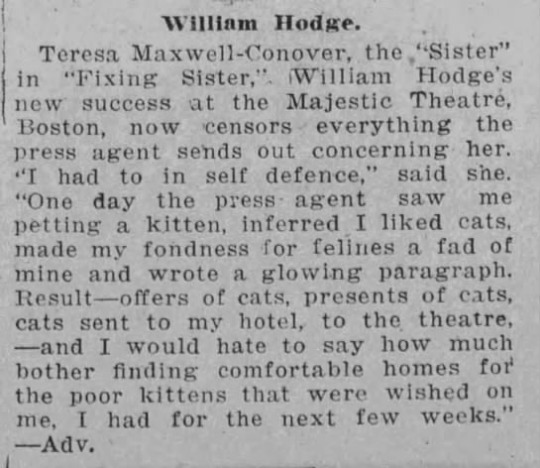
Although the above item appears to be an article, it is actually a paid advertisement! Do not send Miss Maxwell-Conover stray cats!
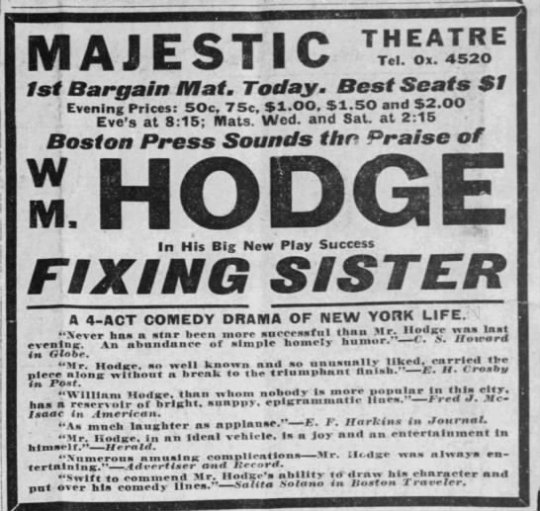
The Boston engagement finally came to an end on April 22, 1916. Although Broadway seemed the next logical step, the play moved to Maine through the end of the month. Hodge then retired to his summer home on Long Island to be with his wife and three small children, looking forward to bringing the play to Broadway in the new season.
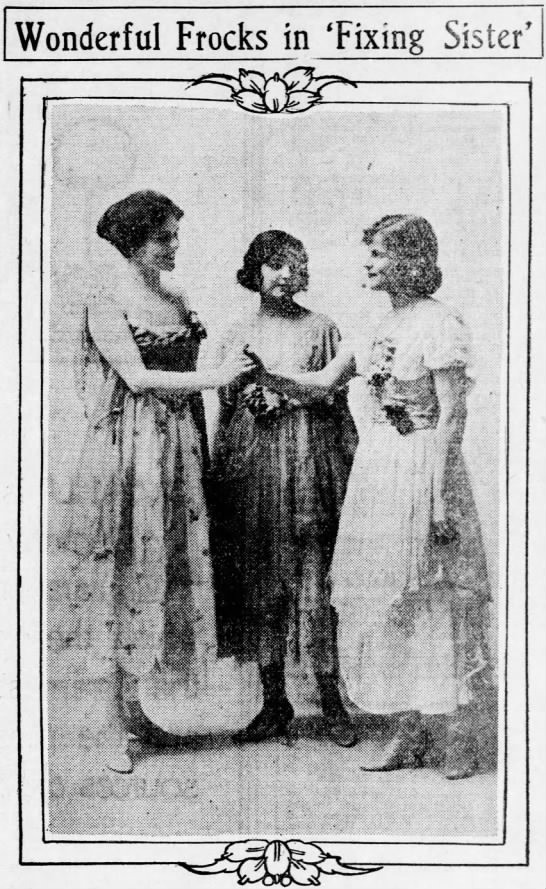
Getting the play back on its feet, Hodge chose Pittsburgh, returning to the Alvin, where the play initially enjoyed a brief stay.
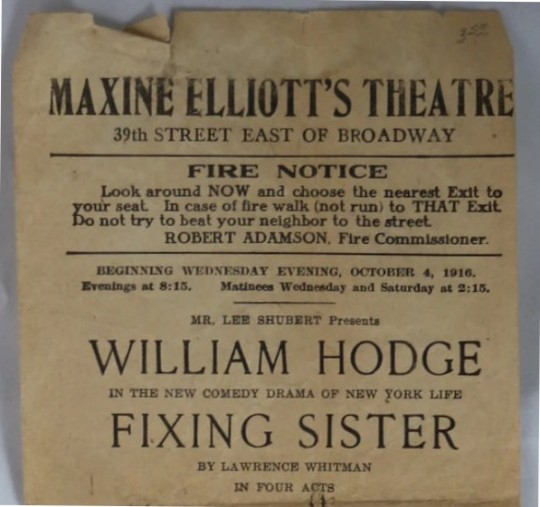
Fixing Sister opened on Broadway at Maxine Elliott’s Theatre (109 West 39th Street) on October 4, 1916.
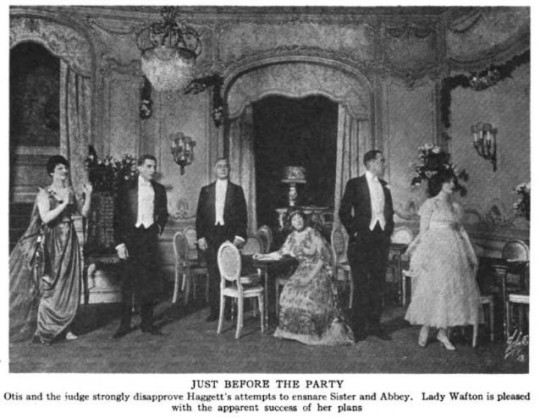
“Early in the play the audience is let into the secret. The onlooker is taken into the confidence of the leading character and the game is won. The audience plays the rest of the piece. The interest and enthusiasm is so alive that it comes in waves to me across the footlights. Such a play is bound to be a delight to both the folk who play it and those who are entertained by it.” ~ WILLIAM HODGE
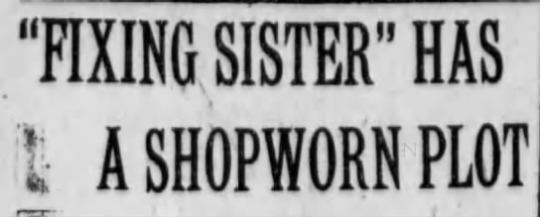
“Mr. Whitman’s play dramatizes the yellow journal idea of society life in Manhattan.” ~ BROOKLYN DAILY EAGLE
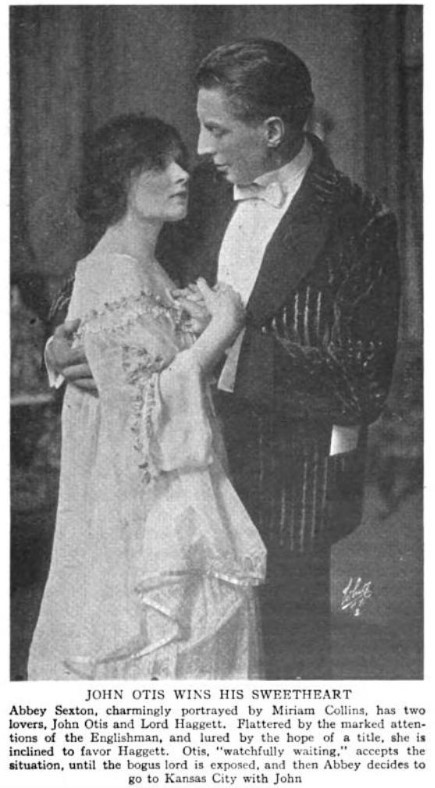
“When will Missouri stop ‘showing’ us New York?” ~ CHARLES DARNTON
Hodge’s character, John Otis, is from Kansas City, Missouri (aka the ‘Show Me’ State)
“Interest is sustained as long as [Hodge] is on the stage, making droll remarks about everything in general in his inimitable manner, but it lags perceptibly when the other characters are depended upon to keep things going.” ~ BROOKLYN LIFE

In early November, the production cleverly addressed rumors that Hodge would close the New York production and tour. A week later, the play was extended, selling advance tickets for as far ahead as New Year’s.
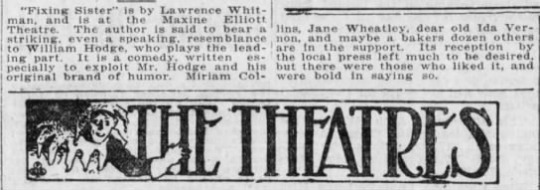
Despite this, Hodge packed his tents and moved the play to Chicago a week before Christmas. It ran on Broadway for 85 performances.
#Fixing Sister#1916#William Hodge#Lee Shubert#Nixon's Apollo Theatre#Atlantic City#Maxine Elliott's Theatre#Broadway#Broadway Play#Broadway Theatre#Lawrence Whitman
24 notes
·
View notes